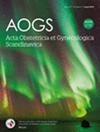Associations between sociodemographic and obstetric factors, and childbirth experience
Abstract
Introduction
Sociodemographic and obstetric factors have been shown to impact childbirth experience, but results regarding the effect of certain factors have been heterogeneous. It is important to understand how individual risk factors affect childbirth experience to be able to identify women at risk for negative childbirth experience. The aim of this study was to determine individual associations between sociodemographic and obstetric factors and childbirth experience.
Material and Methods
The Labor Progression Study (LaPS-NCT02221427) was a multicenter randomized trial examining clinical consequences of using Zhang's guideline vs the WHO partograph on intrapartum cesarean section rate. Four weeks after delivery, 5810 women received the Childbirth Experience Questionnaire (CEQ) online. The CEQ consists of 19 questions on four subscales (own capacity, professional support, perceived safety, and participation). The total CEQ score is the mean score of each of the subscale scores, ranging from 1 to 4, a higher score indicating a better childbirth experience. Sociodemographic (age, body mass index, education, civil status, and smoking) and obstetric (gestational age, prolonged labor, mode of delivery, and obstetric complications) characteristics of the women were recorded, and associations to total and subscale CEQ scores were examined with log-linear regression.
Results
In all, 3604 women answered the questionnaire, a 62.9% response rate. The mean (SD) total CEQ score was of 3.24 (0.43). The subscale score was highest for professional support, mean 3.68 (0.49), and lowest for own capacity, mean 2.61 (0.54). The total CEQ score was not associated with any of the sociodemographic characteristics examined. Smoking in the first trimester was associated with lower scores on the professional support subscale 3.61 (3.55, 3.67) than nonsmokers, 3.69 (3.68, 3.71); p = 0.001. Of obstetric factors, only delivering in week 37 was significantly associated with a higher total CEQ score, 3.34 (3.28, 3.40), vs. 3.24 (3.22, 3.26) at 40 weeks, p = 0.002. Findings remained significant in adjusted analysis.
Conclusions
In our study, individual sociodemographic factors did not impact overall the childbirth experience. Smoking was associated with a lower score on the professional support subscale. Delivery in week 37 was associated with a better overall childbirth experience. No other obstetric factor influenced the childbirth experience.


 求助内容:
求助内容: 应助结果提醒方式:
应助结果提醒方式:


